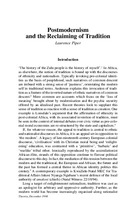| dc.contributor.author | Piper, Laurence | |
| dc.date.accessioned | 2021-01-28T12:34:18Z | |
| dc.date.available | 2021-01-28T12:34:18Z | |
| dc.date.issued | 1998 | |
| dc.identifier.citation | Piper, L. (1998). Postmodernism and the reclaiming of tradition. A Journal of Social and Political Theory, 92, 97-112 | en_US |
| dc.identifier.uri | 10.3167/004058198782486000 | |
| dc.identifier.uri | http://hdl.handle.net/10566/5792 | |
| dc.description.abstract | ‘The history of the Zulu people is the history of myself’.1 In Africa,
as elsewhere, the notion of tradition is bound up with the discourses
of ethnicity and nationalism. Typically invoking pre-colonial identities
as the basis of peoplehood, such narratives of common descent
are imbued with a strong sense of ‘pastness’, orientating the modern
self in traditional terms. Anderson explains this invocation of tradition
as a feature of the inverted nature of ethnic narratives of common
descent.2 More common are accounts which focus on the ‘loss of
meaning’ brought about by modernisation and the psychic security
offered by an idealised past. | en_US |
| dc.language.iso | en | en_US |
| dc.publisher | Berghahn Books | en_US |
| dc.subject | Reclaiming of tradition | en_US |
| dc.subject | Zulu people | en_US |
| dc.subject | Africa | en_US |
| dc.subject | Ethnicity | en_US |
| dc.subject | Nationality | en_US |
| dc.title | Postmodernism and the reclaiming of tradition | en_US |
| dc.type | Article | en_US |

